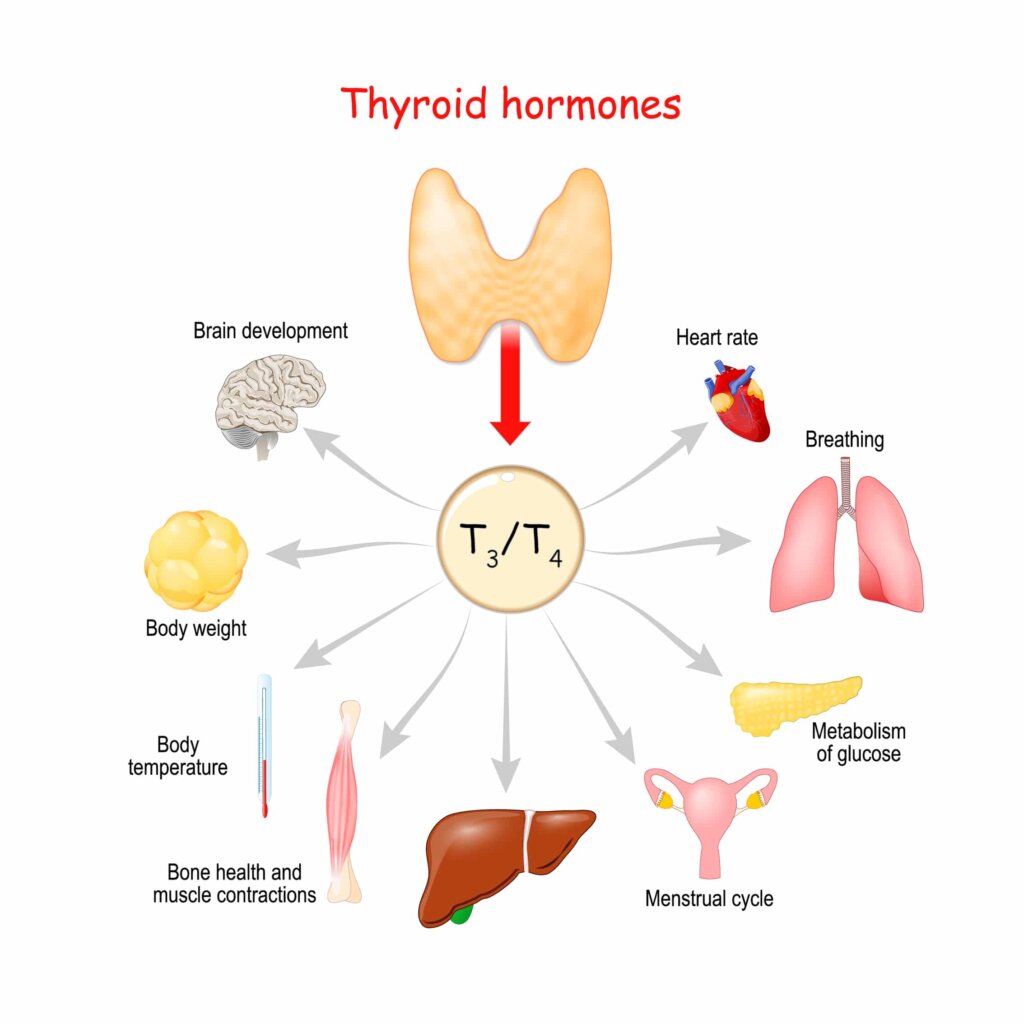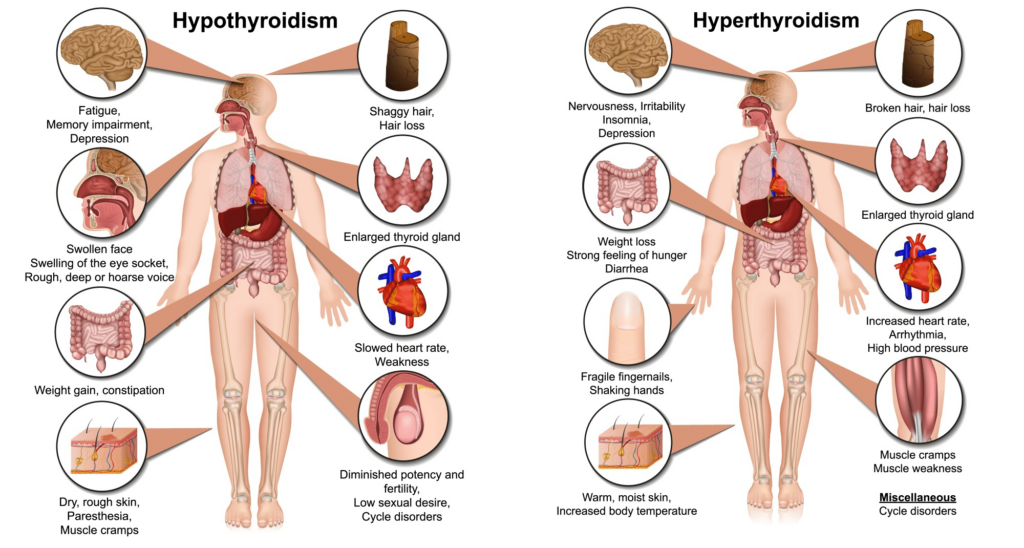To understand thyroid disease, we need to first find out what the thyroid and thyroid gland is.
The thyroid gland
The thyroid gland is a small, butterfly-shaped gland that is located at the front of the neck Thyroid gland makes the thyroid hormones.
Thyroid hormone synthesis
The thyroid gland converts iodine from food into thyroid hormones. This is then stored and released when required. The hypothalamus releases a hormone called thyrotropin-releasing hormone (TRH). This hormone stimulates the pituitary gland to release another hormone called thyroid-stimulating hormone (TSH). TSH then stimulates the thyroid gland to produce thyroid hormones. The hypothalamus and the pituitary gland, which are both located in the brain.
When the levels of thyroid hormone become low, more TRH and TSH are secreted, and the thyroid gland is then stimulated to produce more thyroid hormones. On the other hand, when the levels of thyroid hormones become too high less TRH and TSH are secreted which leads to less production of thyroid hormones.
What does the thyroid do?
The thyroid gland is tasks with thyroid hormone synthesis and produces two hormones.
- Thyroxine which contains four atoms of iodine and referred to as T4.
- Triiodothyronine which contains three atoms of iodine and referred to as T3.
Functions of the thyroid hormone
T3 is the active form used by the body. T4 is converted to T3 in the body. The T3 derived from T4 and the T3 secreted directly by the thyroid gland affect metabolism and the effect include:

- Thyroid hormones affect the rate at which calories are burned. Therefore, too much or two little of these hormones can lead to weight loss or weight gain.
- Increased or reduced heartbeat.
- Increased or reduced temperature.
- Increased or reduced activity of the intestine causing either diarrhoea or constipation.
- Regulate brain development.
- Control the rate of replacement of dying cells.
- Bone maintenance.
- Affect muscle contraction.
- Cholesterol level
- Menstruation
- Breathing
Thyroid and weight gain
Thyroid hormones affect the rate at which calories are burned. This is why too much or two little of these hormones can lead to weight loss or weight gain.
Thyroid and anxiety
Thyroid disease cause either anxiety or depression. A new study linked thyroid inflammation to anxiety disorders. Researchers found that participants in the study with anxiety may also have inflammation of the thyroid gland.
What is thyroid disease?
Thyroid disease is a general term which refers to when your thyroid gland does not make the correct amount of the thyroid hormone. It may make too little (hypothyroidism) or too much hyperthyroidism. Thyroid disorders are more common in women.
Hypothyroidism vs hyperthyroidism
Hypothyroidism is when too little of the thyroid hormone is produced while hyperthyroidism is too much of the thyroid hormone is produced. This image shows the difference between hypothyroidism and hypothyroidism.

Symptoms of thyroid disease
What symptoms a patient suffering from a thyroid disease experiences depends on the type of thyroid disease they have for example a patient with overactive thyroid will experience symptoms of hyperthyroidism while a patient with underactive thyroid will experience symptoms of hypothyroidism. Visit our pages on the different types of thyroid disease to get the full symptoms.
Signs of thyroid disease
Just like in the case of symptoms, the sign a patient suffering from a thyroid disease experiences depends on the type of thyroid disease they have for example a patient with Grave’s disease will experience symptoms associated with it while a patient with Hashimoto’s will experience symptoms associated with it. Visit our pages by clicking the links on the different types of thyroid disease to get the full symptoms.
Types of thyroid diseases
There are different types of thyroid disease. They include
- Hyperthyroidism
- Graves’ disease
- Hypothyroidism
- Hashimoto’s disease
- Thyroiditis
- Goitre
- Thyroid nodule
- Thyroid cancer
Diagnosis of thyroid disorder
To help with the diagnosis of a thyroid disease, your doctor may perform a physical examination and ask you about signs and symptoms of the thyroid disease being suspected. The doctor may also ask about your medical and family history and request thyroid function tests.
Thyroid function test
Thyroid function tests (TFTs) are a different types of tests requested to help ascertain how well the thyroid gland is working and to help in the diagnosis of thyroid disorders. Blood tests requested include the levels of TSH, T4 and T3.
What is TSH?
TSH test
thyroid-stimulating hormone (TSH) is a hormone that is released by the pituitary gland and itself stimulates the thyroid gland to produce thyroid hormones.
Your doctor may do a blood test to find out your TSH levels. TSH is released by pituitary gland and it is this hormone that tells the thyroid gland how much T4 and T3 to make.
What does high TSH mean?
A result that shows a high TSH level most likely means you have hypothyroidism (underactive thyroid). This is because when your thyroid is not producing enough thyroid hormone, the pituitary will keep producing and secreting TSH into your blood.
What does low TSH mean?
A result that shows a low TSH level most likely means you have hyperthyroidism (overactive thyroid). This is because when your thyroid is producing too much thyroid hormone, the pituitary stops producing and secreting TSH into your blood.
T4 tests
T4 comes in two forms
- Free T4
- Bound T4.
Free T4
Free T4 is not bound to a protein in your blood. It is the form that is available for use by the body tissues and as such, the preferred one to test for.
Bound T4
Bound T4 is T4 that is bound to blood proteins and not available to be used by the body tissues. Most of the T4 in the blood is bound.
As there are two forms of T4 in your blood, there are two kinds of T4 tests that can be performed.
- Total T4 test tests for bound T4 plus free T4.
- Free T4 is test tests for only free T4.
Normal thyroid hormone levels
The normal thyroid hormone are as listed below.
What is a normal TSH level?
The normal levels for TSH are 0.5 to 5.0 mIU/L.
What is a normal T4 level?
The normal Total T4 levels are between 5.0 to 12.0μg/dL.
What is a normal T3 level?
The normal Total T3 level are between 80-220 ng/dL.
What is normal free T4 levels?
The normal FT4 levels are between 0.7 to 1.9ng/dL.
Thyroid antibody tests
Thyroid antibodies are produced when your immune system attacks your thyroid gland. Measuring these antibodies may help in the diagnosis of autoimmune thyroid disorders such as Graves’ disease and Hashimoto’s disease.
Thyroid eye disease
Thyroid eye disease also referred to as Graves’ eye disease or Graves’ ophthalmopathy affects 1 in 3 people who have Graves disease. Visit our page on Graves disease to read about it in details.
Causes of thyroid disease
There are various causes of thyroid disorders but the most common cause is due to autoimmune thyroid disease. Visit our specific thyroid disease pages to find out other causes.
What is autoimmune thyroid disease?
Autoimmune thyroid disease is when the body’s immune system attacks the thyroid cells in the same way it would attack foreign cells. This destroys the cells and cause either overactive thyroid (hyperthyroidism) or underactive thyroid (hypothyroidism).
Is thyroid disease an autoimmune disease?
Grave’s disease and Hashimoto’s disease are both autoimmune thyroid diseases. While Graves’s is the most common cause of hyperthyroidism, Hashimoto’s is the most cause of hypothyroidism.
Treatment for thyroid disease
Thyroid hormone replacement for thyroid diseases caused by low thyroid hormone or using Antithyroid hormones to block thyroid hormones synthesis to treat hyperthyroidism. Surgery and radioiodine therapy is also used in treating overactive thyroid. Visit our individual pages on the different types of thyroid disease to get the treatment in detail.
Is thyroid disease hereditary?
Thyroid diseases tend to run in families. Most people who have thyroid disorders have family members with thyroid problems.
